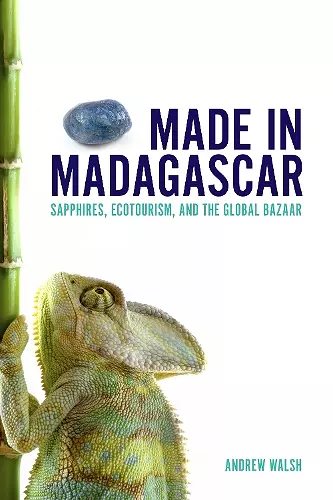Made in Madagascar
Sapphires, Ecotourism, and the Global Bazaar
Format:Paperback
Publisher:University of Toronto Press
Published:4th Oct '12
Currently unavailable, and unfortunately no date known when it will be back

Walsh lures you from the virtually ordered web of 'our interconnected world' into a tightly bound knot of authenticity, ecotourism, sapphires, and everyday lives in a place called Ankarana, Madagascar. The knot is tangled and twisted, but he never loses you along the way. By the end you will learn that global markets seek access to unique and far-away places, and people in unique and far-away places seek access to global markets, but not in the ways that you previously suspected. I recommend this authentic gem of an ethnographic eco-tour to students and advanced scholars alike. -- Jim Igoe, Dartmouth College This book should be required reading for any introductory-level student who has been, or plans to be, a tourist. Walsh beautifully demonstrates the fallacy of the neoliberal agenda that argues that turning the environment into a commodity is the way to save it. -- Richard Robbins, SUNY Plattsburgh A fascinating and accessible ethnography that will delight both neophyte and seasoned anthropologists. -- Todd Sanders, University of Toronto Made in Madagascar is a beautiful and timely ethnography that addresses some of the most important questions in contemporary anthropology. With stunning ethnographic description and careful, clear analysis, Walsh shows how this seemingly remote place has, over the past 500 years, been intertwined with the flows of global capital in ways that have produced both social and ecological landscapes. -- Paige West, Barnard College and Columbia University
Made in Madagascar is an innovative ethnography that explores the tensions and negotiations between the local Malagasy people and foreigners with sensitivity and a critical eye.
Since the 1990s, the Ankarana region of northern Madagascar has developed a reputation among globe-trotting gemstone traders and tourists as a source of some of the world's most precious natural wonders. Although some might see Ankarana's sapphire and ecotourist trades as being at odds with each other, many local people understand these trades to be fundamentally connected, most obviously in how both serve foreign demand for what Madagascar has to offer the world. Walsh explores the tensions and speculations that have come with the parallel emergence of these two trades with sensitivity and a critical eye, allowing for insights into globalization, inequality, and the appeal of the "natural."
For more information, and to read a hyperlinked version of the first chapter online, visit https://madeinmadagascar.wordpress.com.
Walsh has crafted a very useful and timely book. I can see it working well in introductory courses in cultural anthropology, not to mention higher-level courses on globalization. The book gives a nice impression of the current state of fieldwork and ethnography and of the current state of global/capitalist/neoliberal connections and flows. It is a success as ethnography, as a description of world cultural and economic forces, and as a teaching tool. - Anthropology Review Database This is a terrific book. It is aimed at students and is written in an accessible and engaging style, but I think it should appeal to the wider scholarly community because it has a lot to offer in empirical and conceptual terms. The apparent simplicity of the book makes it an immensely powerful and lively statement on the ways that global dynamics shape and reshape human communities and the environments they inhabit. - Anthropos As the first line [of the preface] suggests, this is primarily a 'teaching' book, which is to say, Walsh grounds abstract ideas in ethnographic anecdotes and explains connections with crystal clarity. The book is engaging, accessible, and short, and it manages to clarify in a mere 112 pages of text several key anthropological concepts, including cultural relativism, globalization, social construction, place-making, nature versus culture, the sacred and the profane, 'the gift,' and commodity fetishism. - Genese Marie Sodikoff, Environment and Society
ISBN: 9781442603745
Dimensions: 229mm x 155mm x 10mm
Weight: 230g
128 pages